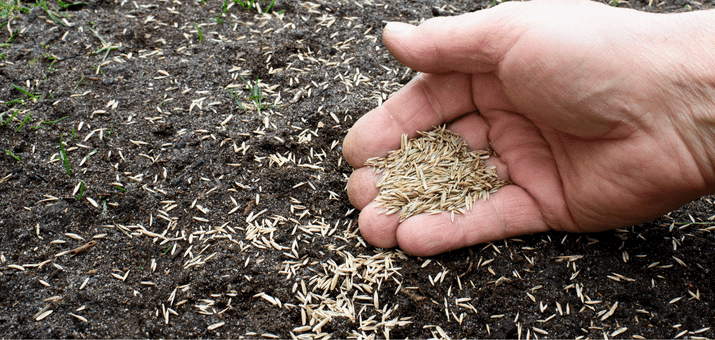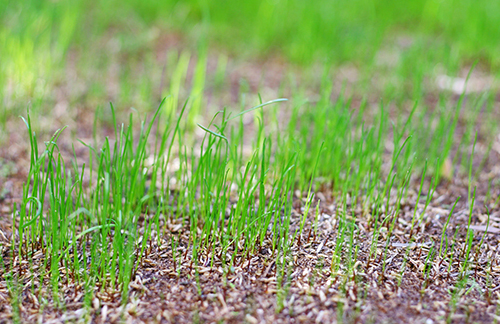As an Amazon Associate, I earn from qualifying purchases.
Grass seed typically germinates within 7 to 21 days. The exact time depends on the grass type and growing conditions.
Planting grass seed is a great way to achieve a lush, green lawn. Different grass types have varying germination periods. Factors like soil temperature, moisture, and sunlight play crucial roles. Warm-season grasses generally take longer to sprout compared to cool-season varieties.
For optimal results, ensure the soil is well-prepared and consistently moist. Proper care during the initial stages can significantly impact growth. Understanding the germination timeline helps in planning and maintaining your lawn effectively. By following best practices, you can enjoy a healthy and vibrant lawn in no time.
Introduction To Grass Seed Germination
Grass seed germination is the process where seeds sprout and grow. Proper germination is crucial for a lush lawn. Seeds need the right conditions to start growing. They require water, air, and the correct temperature. A well-prepared soil bed helps seeds settle in quickly.
Proper germination ensures a healthy lawn. It prevents patchy growth and soil erosion. Good germination results in strong grass plants. These plants can resist diseases and pests better. Properly germinated grass also requires less maintenance.
Several factors influence grass seed germination. The type of grass seed is important. Some seeds germinate faster than others. Soil temperature plays a key role. Most grass seeds need soil temperatures between 55°F and 75°F. Soil moisture is also crucial. Seeds need consistent moisture to sprout. Too much water can drown the seeds. Not enough water can dry them out.
Soil quality affects germination. Good soil has the right nutrients and pH level. Proper sunlight is essential for growth. Some grass types need full sun, while others prefer shade. Lastly, the time of year matters. Spring and fall are the best seasons for planting grass seed.

Credit: www.pennington.com
Types Of Grass Seeds
Cool-season grasses are best for cooler climates. They thrive in spring and fall. These grasses include fescue, ryegrass, and bluegrass. Fescue is very popular and easy to grow. Ryegrass germinates quickly, making it ideal for fast coverage. Bluegrass has a fine texture and deep green color.
Warm-season grasses are suited for hot climates. They grow best in summer. These grasses include Bermuda, Zoysia, and St. Augustine. Bermuda grass is very drought-tolerant. Zoysia grass is dense and resistant to foot traffic. St. Augustine is good for shaded areas.
Ideal Conditions For Germination
Grass seeds need the right temperature to grow. Cool-season grasses prefer temperatures between 60°F and 75°F. Warm-season grasses grow best in temperatures between 80°F and 95°F. Keeping the soil at the right temperature helps the seeds sprout quickly.
Healthy soil is key for grass seed germination. Start by removing rocks, weeds, and debris. Use a rake to level the soil. Adding organic matter like compost can improve soil quality. Make sure the soil is moist but not soaked. Good soil contact helps seeds sprout faster.
Watering Techniques
Grass seeds need plenty of water to start growing. Water the area immediately after planting the seeds. The soil should be moist but not too wet. Use a gentle spray to avoid washing away the seeds. Water once a day, early in the morning. Continue this for the first two weeks. This helps the seeds germinate properly.
Keep the soil consistently moist for the next few weeks. Watering too much can drown the seeds. Watering too little can dry them out. Check the soil daily to ensure it’s damp. Use a light spray to prevent soil erosion. Watering in the morning is best. It helps the soil stay moist throughout the day.
Timeframe For Germination
Cool-season grass seeds usually germinate in 5 to 10 days. These grasses prefer cooler temperatures. Examples include fescues and bluegrass. It’s best to plant them in early spring or fall. Keep the soil moist for the best results. Germination happens faster in the right conditions. Avoid planting during extreme heat or cold.
Warm-season grass seeds take longer to germinate. They often need 10 to 30 days. These grasses thrive in warmer temperatures. Examples include Bermuda and zoysia. Plant these seeds in late spring or early summer. Warm soil speeds up the germination process. Ensure the soil stays moist but not waterlogged.
Common Germination Problems
Over-watering can drown the seeds. Too much water removes air from the soil. Seeds need air to breathe. Wet conditions can lead to mold. Mold can kill the seeds before they sprout. Water your grass seeds lightly. Keep the soil moist but not soaked. Check the soil often to avoid over-watering.
Under-watering can dry out the seeds. Dry seeds cannot sprout. Seeds need moisture to start growing. Make sure the soil stays damp. Water the area daily if needed. Especially in hot weather, keep the soil moist. Dry soil can delay germination. Use a sprinkler to cover the area evenly.
Tips For Faster Germination
Achieve faster grass seed germination by keeping soil consistently moist and well-aerated. Ensure optimal sunlight and temperature conditions for quicker growth.
Using Starter Fertilizers
Starter fertilizers help new grass grow strong. They give seeds the nutrients they need. Spread the fertilizer evenly over the soil. Follow the instructions on the bag. This will make sure you use the right amount.
Proper Seed Coverage
Proper seed coverage is key. Cover seeds with a thin layer of soil. This protects them from birds and wind. It also helps keep moisture in. Use a rake to spread the soil evenly. This will help the seeds stay in place.

Credit: swellseedco.com
Maintaining New Grass
First mowing of new grass is crucial. Wait until the grass reaches about 3 inches high. Ensure the mower blades are sharp to avoid pulling the grass. Set the mower to cut only the top third of the grass blades. This encourages stronger root growth and a healthier lawn.
After the first mowing, continue to water the grass regularly. Keep the soil moist, but not waterlogged. Avoid heavy foot traffic on the new grass to prevent damage.
Continued care involves regular mowing and watering. Fertilize the grass after the third mowing. Use a balanced fertilizer to promote strong growth. Watch for weeds and remove them promptly. Inspect the lawn for any signs of disease or pests.
Maintaining a new lawn requires patience and attention to detail. With proper care, your grass will grow strong and healthy.

Credit: m.youtube.com
Frequently Asked Questions
How Long Does Grass Seed Take To Germinate?
Grass seed typically takes 5 to 30 days to germinate, depending on the type. Conditions like soil temperature and moisture levels can affect germination time.
What Affects Grass Seed Germination?
Grass seed germination is affected by soil temperature, moisture, seed type, and light. Proper conditions can speed up germination.
Can I Speed Up Grass Seed Germination?
Yes, you can speed up germination by keeping the soil consistently moist and ensuring the temperature is optimal for the seed type.
Does Grass Seed Need Sunlight To Germinate?
Most grass seeds require sunlight to germinate. However, some types can germinate in partial shade.
Conclusion
Understanding grass seed germination times helps achieve a lush lawn. Patience and proper care are crucial. Ensure optimal conditions like soil quality, moisture, and temperature. With the right approach, you’ll enjoy a vibrant, healthy lawn. Happy gardening!

